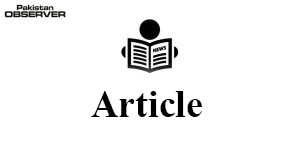Corona vaccine hesitancy and its possible antidote
COVID-19, its associated complications and rapidly emerging variants ofCOVID-19 virus have wrecked the whole world.
The perplexing agony associated with the unavailability of specific drug therapies so far has forced the nations to aim for herd immunity through vaccination.
The ballpark figure of COVID-19 vaccine coverage is unknown (likely threshold proportion 80-90%), but a higher proportion of vaccinated people is always desirable.
The immunization program against COVID-19 has been thwarted massively by unsubstantiated reports of morbidity and mortality related to the COVID-19 vaccine.
The vaccine hesitancy driven by conspiracy theories is not a newfangled dilemma. Recognizing the ramifications of the vaccine hesitancy, the World Health Organization (WHO) coined this as the top ten threats to global health in 2019.
Regardless of laudable efforts of the Pakistani government in terms of ensuring availability of COVID-19 vaccine, its uptake continues to be problematic for the regulators predominantly due to conspiracy theories resulting from mis-and disinformation.
As of 27 August 2021, death toll due to COVID-19 has reached 25,415 cases in the country, whereas only 14.9 million people are fully vaccinated against the disease. This is strikingly lower than the regional average of COVID-19 vaccination in Asia.
Given the longstanding failure of the anti-polio program in the country, primarily due to a conspiracy theory – the vaccine was a part of the Zionist grand plan to make Muslim population impotent-, the low uptake of COVID-19 vaccine seems alarming. Unfortunately, many conspiracy theories are being spread in Pakistan against COVID-19 vaccines.
A common perception holds that Bill Gates’s support of vaccination efforts is a way to implant tracking devices or micro-chips in humans to control their brains.
In the same way, a conspiracy theory endorsed that Indians made the vaccine with some harmful ingredients because of historical rivalry.
The misinformation gets awful when an influential person or a celebrity or a religious leader, passes remarks or promotes an anti-COVID-19 vaccine agenda. For example, the COVID-19 vaccine was developed to promote incest and target Islamic norms.
The rumours that the COVID-19 vaccine contains cells from aborted fetus or genes from pigs also raised religious concern among Pakistani population.
The other most renowned conspiracy theories reported in various Pakistani studies include: mala fide profit intentions of pharmaceutical companies, the vaccine can turn people gay or make them infertile, the vaccine can cause visual impairment, etc.
Conspiracy theories aside, the majority of the people are worried mostly about the safety of the vaccine regardless of the fact that the vaccines had been through all the necessary stages of testing.
The hesitancy and conspiracy theories against vaccination in Pakistan stem from poor health literacy, religious and cultural beliefs, and spread of mis-and disinformation.
To shed light on people’s intentions and conspiracy beliefs as well as factors that are allied with these beliefs, the Centre for Economic Research in Pakistan conducted Economic Vulnerability Assessment surveys.
According to the findings of these surveys, about 30% people were reluctant to get themselves vaccinated and 5% people were uncertain about the COVID-19 vaccination.
Fortuitously, vaccine hesitancy is not interconnected with socioeconomic background up to now, but it was found in many studies that attitudes seem to be positive among those who are more educated.
However, recent death of non-vaccinated pregnant lady doctors contradicts these findings and indicate the severity of the conspiracy dogma among highly educated population.
The anti-vaccine behaviour of even educated people in Pakistan indicates that how much it would be difficult for the government to improve vaccine acceptance among people with lower education and those living in rural areas.
To halt these fictitious beliefs and to increase the COVID-19 vaccine acceptance, policymakers need to take the necessary measures.
The WHO strongly advocates dissemination of evidence-based information to pledge mis-and disinformation in this highly digitalized world. In this regard, first and foremost, the negative effect of social media on propagation of theories demand a multi-pronged strategy.
The national level fact-check on social media and online presence of concerned experts might be antidote to misinformation.
Besides, the Pakistan Electronic Media Regulatory Authority needs to control exaggerated or falsified statements eliciting negative perceptions related to the COVID-19 vaccine. Only healthcare researchers and professionals should be allowed to have discussions on COVID-19, as debates with political figures are prone to false claims and information.
Second, given that the majority of Pakistani public respect the advice of Islamic scholars, their involvement in awareness regarding COVID-19 can address religious beliefs linked to conspiracy narratives and resistance to vaccination.
Third, given that safety concerns are also one of the main reasons for the anti-vaccination behaviour, efforts are required to assure the population about the safety and effectiveness of the vaccines and to educate them about tolerable side effects.
Parallel to the developed world, the government may also consider community pharmacist led immunization to improve the uptake of COVID-19 vaccination, since pharmacists have proven influence on public health through effective consultation on how the vaccine works, what it contains, probable risks and adverse effects.
In sum, vaccine hesitancy has already been a major barrier to curb the vaccine-preventable diseases in Pakistan, and such seditions have planted seeds of hindrance against the COVID-19 vaccination program. The status quo threatens to prolong the catastrophic consequences of the COVID-19 pandemic.
Concerted efforts of healthcare regulators, media, religious scholars and motivational speakers are needed to cope with conspiracies resulting from an amalgam of poor health literacy, religious and cultural beliefs and mis-and disinformation.
—The writer is Professor of Pharmacy Practice and Chairman of the Department at the Islamia University, Bahawalpur.










